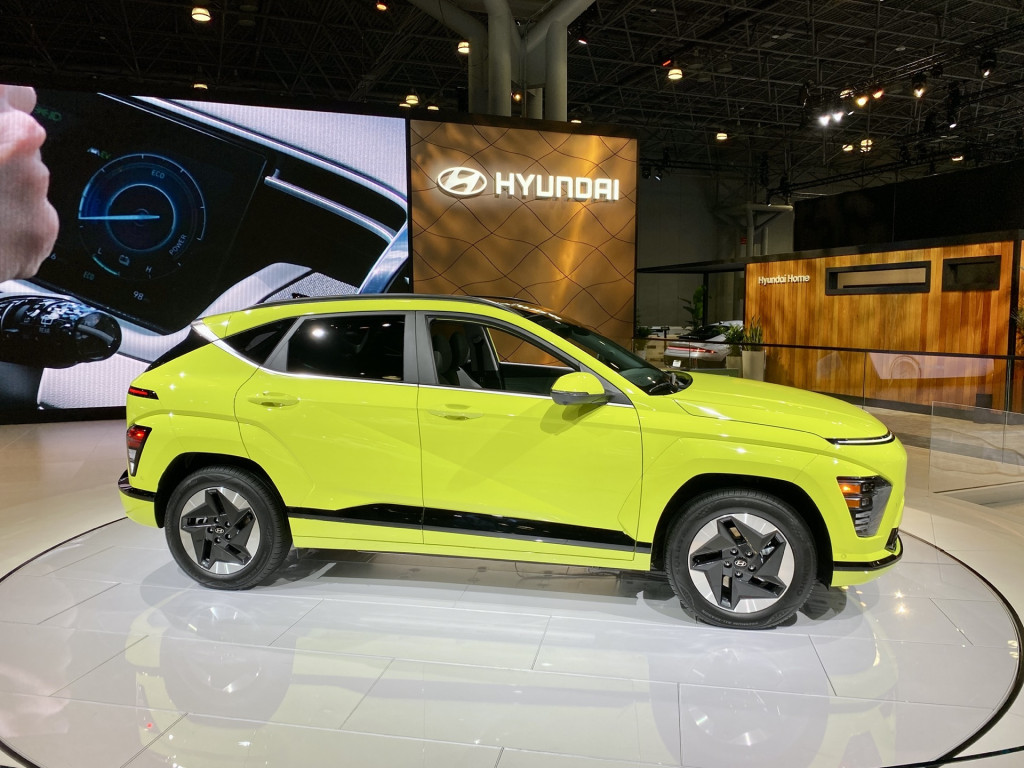Hyundai this week, at the New York auto show, revealed U.S.-spec details for the redesigned 2024 Kona Electric, along with the Kona Limited and Kona N Line gasoline models.
What was missing from the announcement was the Kona Hybrid, a model that had been emphasized as a growing and important model in the revised Kona’s global rollout.
Hybrid versions of the Kona aren’t part of the plan for the U.S., according to spokesperson Miles Johnson. Kona Electric sales have been comprising about 6% of total Kona sales up until now, according to Johnson, but with the redesigned Kona lineup it plans to raise that percentage significantly.
What may help enable broadened sales of the Kona Electric, despite its lack of eligibility for the revamped EV tax credit, is the availability of a standard-range version offering a preliminary 197 miles of EPA range from 48.6 kwh of capacity—and almost surely a lower price versus the outgoing 64-kwh model’s $34,885 base price. Up the lineup, the Kona Electric has a slight upgrade in the battery pack capacity of its longer-range version—to 64.8 kwh, stretching its preliminary EPA range out to 260 miles.
In the wake of EV tax credit upheaval, that’s a good decision, as it leads with value and might avoid the now-awkward pricing position of the otherwise-appealing 2023 Kia Niro EV. Pricing for the Kona Electric hasn’t yet been revealed.
2024 Hyundai Kona Electric

2024 Hyundai Kona Electric

2024 Hyundai Kona Electric
Standard-range Kona Electric versions will make 133 hp, versus the long-range versions’ 201 hp, although both will make 188 lb-ft of torque. So expect standard-range models to likely accelerate to 60 mph in closer to eight seconds versus the long-range versions’ circa-seven-second time.
The decision not to bring the Kona Hybrid may also have been influenced by its rather slow acceleration in this configuration—about 11 seconds for the 0-62 mph dash, incorporating its 1.6-liter inline-4, 42-hp electric motor, and 6-speed dual-clutch transmission with a 1.56-kwh battery pack.
The Kona Electric doesn’t operate on the 800-volt architecture that’s the foundation for the Ioniq 5 and Ioniq 6, among other models, although it’s pretty quick with the longer-range pack’s 400 volts, at 10% to 80% charge in 43 minutes, achievable with an increasingly common 150-kw CCS fast-charging connector.

2024 Hyundai Kona Electric (global)
The design of the Kona electric, as seen in person last week at the show, has become sleeker and more distinctive than that of the outgoing model, and it boasts a coefficient of drag of 0.27. As Hyundai has hinted from the start with this generation of the Kona, it developed the electric version from the start—and applied this “EV-led design” to the whole lineup.
As such, it borrows some of the angular creasing and sculpting of the Tucson Hybrid crossover and Elantra Hybrid sedan families, but it’s the first model outside the Ioniq EV lineup to bring in the “Parametric Pixel” lighting—in the form of thin-strip detailing that up close makes this model look more than an inch wider than the outgoing version.

2024 Hyundai Kona Electric
Dimensions are just slightly larger in all aspects, actually. According to Hyundai the Kona is 5.7 inches longer, and it rides on a wheelbase 2.3 inches longer than the previous version.
As before, the Kona Electric doesn’t make any packaging sacrifices in EV form, even though it shares its platform with internal combustion versions. Hyundai says that the front seats are 30% slimmer, while the second row is a “curveless Bench Seat”—together boosting backseat space significantly. Cargo space is a generous 25.5 cubic feet with the rear seatbacks up or 63.7 feet with them folded forward, and a power tailgate is now offered. The shift lever has been moved behind the steering wheel to free up console space, and there’s a very small frunk compartment under the hood.

2024 Hyundai Kona Electric

2024 Hyundai Kona Electric

2024 Hyundai Kona Electric
Gasoline versions of the Kona, this time around, include a 190-hp, 1.6-liter turbo-4 with an 8-speed automatic transmission, and a 147-hp, 2.0-liter inline-4 that runs on the Atkinson cycle for greater efficiency. Kona Electric models get a multi-link rear suspension versus the gasoline models’ torsion-beam setup.
With no hybrid on board for the U.S., Hyundai has effectively underscored the stark difference in strategy versus rival Toyota, which is rolling out a sub-$30,000 Corolla Cross Hybrid. This week Toyota also confirmed plans to continue expanding hybrid offerings and add plug-in hybrids with much more electric range.
Hyundai says that gasoline versions of the 2024 Kona will arrive at U.S. dealers this summer, while the Kona Electric will follow this fall. The 2023 Kona Electric was only available in 26 states, although Hyundai is steadily expanding EV availability. And with the standard-range Kona Electric joining the lineup, and pricing not yet announced, here’s to hoping the Kona Electric will be more competitive versus the $28,795 Chevy Bolt EUV.
Read the full article here


